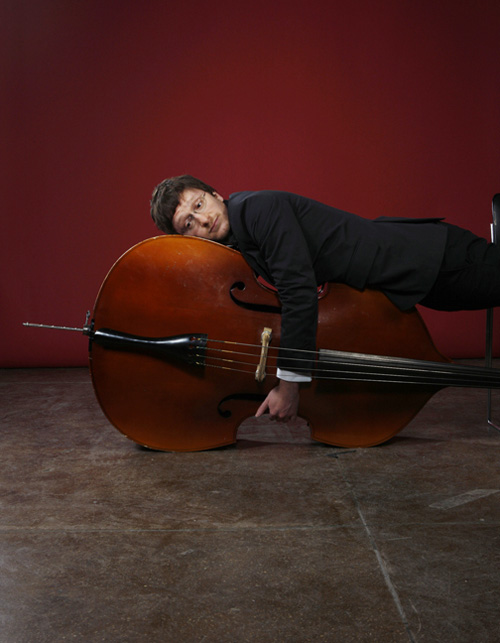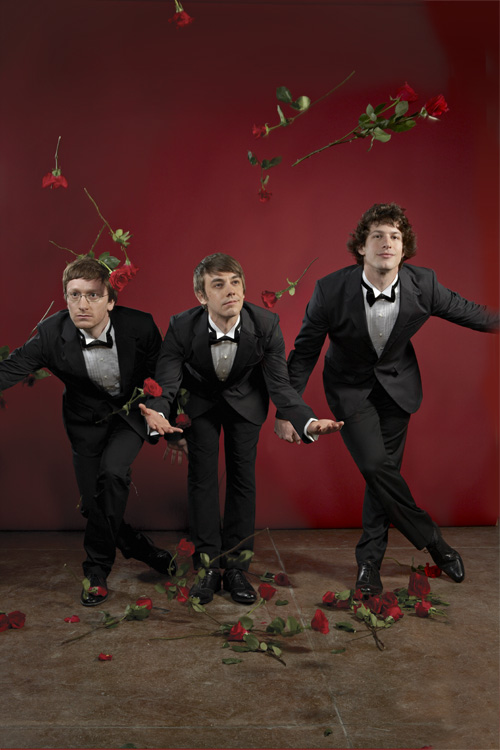As the scruffy artists file into their lab for design class at Brooklyn multi-arts space, 3rd Ward, each lets out a small, discernable gasp. For there on the room’s sole couch lounges Saturday Night Live cast member Andy Samberg, flanked by writers Jorma Taccone and Akiva Schaffer—the comic trio known as The Lonely Island (TLI). No, they aren’t here for a guest lecture or to brush up on their Photoshop skills. Oblivious to the venue’s class schedule, they have commandeered the lab for this interview. Here inside the jokesters’ 24-7 comedic universe, even the students’ mere puzzlement becomes ripe for parody. The trio can’t help but mug for their adoring fans. Grinning like a jolly Cheshire cat, Jewfro’d Samberg greets the students with, “Hey, how’s it going?” and “We’re doing an interview—it’s pretty cool.” Drinking in the famous “Dick in a Box” crooner, the bewildered students ogle and giggle as they head to their computer stations.
The Lonely Island’s recognition factor—even in a Brooklyn neighborhood that generally shuns mainstream culture—comes as no surprise. The success of TLI’s viral videos has reached epic proportions, catapulting the trio into the comedy firmament. Cutting their teeth as an Internet phenomenon, they have made their mark on TV, film and, as of this past February, music. They even have an album on the shelves: Incredibad, a collection of both new tracks and old favorites.
Lined up on the taupe-colored couch, the guys resemble three peas bursting from a pod. Samberg—”the goofy one”—exudes a slapstick demeanor (even when he’s just relaxing on the sofa) that immediately evokes pratfall masters like Jim Carrey and Steve Martin, with a touch of Ashton Kutcher’s Kelso of That ’70s Show. Taccone—who is slightly less spastic—sports a more conventionally boyish hairstyle and could easily pass for a member of some hot, young indie band. He’s the first to introduce himself, and so I assign him the role of “the charming one.” And Schaffer—a dead-ringer for John Lennon, with a touch of Tobey Maguire-brand earnestness and just a dash of computer geek —clearly reigns as “the judicious one.” Despite being different types, however, they’ve all been blessed with the comedy gene, and, together, share an amazing chemistry.
Feeding off each other’s energies, they gesticulate wildly, their elbows jabbing into eye sockets with fists pumping in excitement as they recount the story of their wobbly rise to celebrity. America first met Samberg and Co. back in 2001, the year they launched a comedy website called The Lonely Island. The three shared a cramped apartment in Los Angeles, Samberg remembers fondly. Busting out a sarcastic smile, he wraps his arms around his buddies and squeezes them tightly, attempting to simulate the close, nay, uncomfortable, living situation in which the three junior high friends from Berkeley, California, rolled out scores of comedy videos.
Their first project was a low-budget sitcom titled The Lonely Island. The show lasted two episodes, the second of which they adapted into a full-length pilot for Comedy Central (which ultimately got nixed). One of their next big projects was The ‘Bu, a riff on teen soap opera The O.C. The show was about young, sexy people who live in Malibu, but they call it “‘Bu,” because, according to the tagline, “When you say the entire word, it takes time, and then you wouldn’t be young anymore.” The ‘Bu’s surprising cult following earned them a shot at another television project, Awesometown. The pilot was shot for FOX before it was also unceremoniously axed—apparently, it’s still a sore spot for the guys.
“As you can see, it totally worked out,” Taccone kids.
“It was on for 10 years,” says Samberg, setting up the assist.
“It’s called Seinfeld,” Schaffer dead-pans, sending Samberg into gales of laughter.

The Lonely Island may have a few years to go before achieving a Jerry Seinfeld-like level of commercial success, but the guys have come a long way since the days of making homemade, roughly hewn musical parodies of Dr. Dre and Eminem.
While Samberg, Taccone and Schaffer tell the story of their road to success—finishing each other’s sentences and jostling for space on the couch—it’s easy to see how they’ve kept it together for the past nine years. To put it plainly, these funny guys love each other. (Their publicist brags: “They make my job so easy. Whenever you call one of them for an update, the other two are always there too.”) As I watch them stop mid-conversation, catch each others’ eyes and then erupt into a torrent of jokes, hair tousles and bromantic side-hugs, I briefly wonder what would happen if I left the room. Most likely, they would carry on, cracking jokes and acting like the junior high school buddies they once were (instead of the Emmy-award winning trio they have become). Yeah, they’re goofballs, but it is this lighthearted approach, mingled with a seemingly unending supply of genius comedic notions, that has endeared them to fans and sent them on their way to stardom.
It didn’t take long before industry insiders took notice of TLI. After working with Samberg, Schaffer and Taccone on the MTV Movie Awards in 2005, ex-SNL cast member Jimmy Fallon introduced the guys to Lorne Michaels. Several meetings and auditions later, Michaels cast Samberg as an SNL player and hired Schaffer and Taccone as writers. Soon after, on that most iconic of late night shows, the proverbial magic happened: The SNL Digital Short, a more sophisticated facsimile of TLI’s earlier work, was born. Now TLI’s number one export, this (oft-times musical) mini-video has played a definitive role in popularizing YouTube. After “Lazy Sunday” (an infectious rap video that features Samberg and fellow castmate Chris Parnell rapping about a screening of The Chronicles of Narnia) first aired on SNL in December 2005, thousands of bootleg copies began flooding YouTube, generating more than five million hits by February 2006 (according to computer enthusiast website Ars Technica, the success of this inaugural digital short impacted YouTube’s subsequent $1.65 billion sale).
Enter the viral video, a star-making vehicle for any Joe Blow with a video camera, a laptop and a dream. TLI’s second viral hit, 2006’s “Dick in a Box” (a ’90s R&B parody starring Samberg and pop singer Justin Timberlake), generated a larger response: “I heard a lot of stories about people putting [their dicks in boxes] and then showing them to people,” Samberg says. “I heard a dude did it at work and got fired. And I heard a lot of guys did it for their girlfriends or wives for Christmas,” he adds with genuine amazement, having completely underestimated the fratty segment of his fan base. But that’s only one sector of TLI’s fawning followers. Everyone—from high profile celebs to your Auntie Minna—has hopped on board the parody express, starring/making cameos in TLI videos or simply becoming fans (hell, even Martha Stewart, who baked pumpkin pies with Samberg on her show, is a devotee).
The amazing success of “Dick in a Box” officially crowned Samberg comedy royalty. Since then, he has routinely jammed with celebs on SNL—from Natalie Portman (“Natalie Raps”) to Maroon 5’s Adam Levine (“I Ran So Far”)—and has carved out a small but promising film career. He starred as the daredevil lead in 2007’s Hot Rod—a modestly successful film directed by Schaffer and co-starring Taccone—which follows the story of Rod Kimble, who, along with his slacker friends, orchestrates a dangerous stunt performance to raise money for his ailing stepfather’s heart surgery. And, most recently, Samberg plays a gay weight trainer who only digs straight dudes in the new comedy I Love You, Man. Not one to rest on his comedic laurels, he’s also in the midst of another film project, lending his voice to the upcoming children’s book-turned-animated-disaster-parody, Cloudy With a Chance of Meatballs. Over the last three years, the actor has enjoyed the majority of the group’s fame—appearing in magazines such as Esquire; shooting the breeze on primetime talk shows such as Late Night with David Letterman and popping up in major newspapers, including The New York Times.
Samberg is clearly a hot commodity, and the kids here at 3rd Ward are proof positive: they’re full-on gaping at him, still whispering in excited tones. A handful of more brazen students commence pointing at their crotches and gesturing at the comedian, perhaps seeking out an impromptu performance of his ode to genitalia. Still, judging by the impassive/quizzical looks they’re shooting at Taccone and Schaffer, much of this present enthusiasm seems reserved for the mop-topped comic alone. Most likely, the kids have no idea who the other two are (even though Taccone and Schaffer crooned alongside Samberg in “Jizz in My Pants” and “I’m on a Boat,” respectively). That’s pretty much standard for the writers. Fans, the media and critics alike have generally overlooked the pair.
For example, even though Hot Rod was a collaborative effort, as the star of the film, Samberg received the bulk of its buzz. Similarly, the Creative Arts Emmy for Outstanding Original Music and Lyrics for “Dick on a Box,” which was presented to the entire group, is often attributed (in online articles and comedy/entertainment blogs) to Samberg alone. In terms of sheer mainstream recognition, Taccone and Schaffer have yet to break on through to the other side, even though the three contribute fairly equally to every comedic endeavor.
“The way we make decisions is very democratic,” Taccone says. “If two of us see an idea and the third one doesn’t get it, it’s majority rules” he adds.
“The third guy gets slimed,” Schaffer says, looking at Taccone.

“Basically they reject all of my ideas,” Taccone jokes, manufacturing a pouty mug. He thinks for a moment, and then whips around to face the other two.
“Then why did I get slimed after ‘Dick in a Box’?” he asks.
“Because you jizzed yourself,” Samberg plainly concludes. Although Taccone nods his head in touché-like accord, as it turns out, Samberg is the real guilty party.
“I’ll say it,” ventures Samberg, scanning the room to make sure the gaping computer geeks are out of earshot. “Yes, it happened to me.”
“With no stimulus at all?” poses a concerned Schaffer, furrowing his brow.
“I was just sitting there,” Samberg counters nonchalantly, gesturing down at his relaxed posture, as if to suggest that he could go off at any time. It’s an apt metaphor for the explosion of attention that has surrounded Samberg, (as of now) eclipsing Schaffer and Taccone.
All of that could change, of course—especially the more Schaffer and Taccone find themselves in front of the camera and the more TLI becomes a name brand like Tenacious D or Flight of the Conchords. “We’re huge fans of Tenacious D and FOTC,” Taccone says. TLI share much in common with these two hilarious groups—all three are able to expertly dissect a range of genres, a skill acquired from voracious musical consumption. According to Samberg, TLI is into everything—except stutter music. “It’s like Polish rap,” he says. After a minute or two of ripping on musical subcultures, Schaffer tries to bring the conversation back into the realm of the serious: “We tend to gravitate toward hip hop, because that’s what we grew up listening to and that’s what we love.” Despite their natural predilection, nothing is immune to their satirical gaze.

What truly distinguishes TLI from other musical parodists, however, is their ability to take a genre that seems naturally connected to the gaze of outsiderness and make it feel inside. Their use of big-name celebrities and increasingly elaborate video productions make it hard to view them as merely riffing on the mainstream. Hell, they even got T. Pain to mock himself in their rap video send-up, “I’m on a Boat.” TLI are more than shtick—they’ve got bona fide talent and a growing fan base than extends well beyond Weird Al-loving comedy geeks.
Samberg laughs as he recalls pitching “Dick in a Box” to Timberlake: “We’re gonna do, like, an early ’90s R & B-style song and it’s gonna be about giving girls your dick in a box.” Impersonating a giddy Timberlake, Samberg squeals, “‘Yes, awesome, let’s do it!’ “
“He was more sure about it than we were,” adds Schaffer.
Not all of their celebrity collaborators have been as gung-ho as Timberlake. While making “Natalie’s Rap,” in which the polished Portman curses like a sodden sailor, Taccone says, “Natalie came to us just sort of livid, waving this paper.” Taccone expertly channels Portman, pitching his voice about three octaves higher than usual, flailing his arms about in a frenzy: “‘There’s 16 moments that you guys need to bleep for this!'” All three agree that the censorship, complete with amusing sound effects, has only added to the hilarity. “I’m so glad the album doesn’t have the bleeps. We wanted people to really listen to the content,” Schaffer jokes.
At this point, I realize that we’re about 30 minutes and 5,000 jokes into the interview and we’ve barely touched on the album. The excited energy crackling about the room isn’t helping matters, either. The kids are operating at fever pitch, adding a constant stream of excited whispering to the chorus of keyboard-clacking and modem-humming. I briefly consider slapping the desk, schoolteacher-style, in some sort of desperate plea to wrangle TLI’s attention and get down to Incredibad business, but I settle on pulling out a page of track listings. The boys (amazingly) acquiesce: Incredibad (which comes with a DVD full of shorts), features 19 hilarious refrains (including “Lazy Sunday,” “Dick in a Box,” “Jizz in My Pants,” “Natalie’s Rap,” “I Ran So Far,” “Ras Trent,” “I’m on a Boat,” “We Like Sportz” and “Space Olympics”), and boasts an assortment of new genre parodies and celebrity collaborations. Everyone from Norah Jones and Jack Black to E-40 and Strokes frontman Julian Casablancas get in on the action. With such dynamic content and plenty of hot celebrity guest talent, what’s up with the über-negative album name?
“Well, that’s pretty much what it is: Incredibly bad,” quips Schaffer, conspicuously imploring his buddies to get in on his joke. Samberg and Taccone instantly nod in deadpanned agreement.
“It totally sucks,” says Samberg.
Schaffer gets back to reality. “No, actually, there’s a song on there called ‘Please, Incredibad, Don’t Hurt ‘Em,’ which references a MC Hammer album,” he explains.
Well, that explanation makes more sense, considering the fact that the guys snagged some pretty kick-ass producers to work on the album, including big names such as Jurassic 5’s DJ Nu-Mark, acclaimed Queens-based producer DJ J-Zone and master reggae production team Sly & Robbie, “which was obviously a big get…for them,” Samberg says.
“Their 800,000th reggae song was ours,” Schaffer says. “To make a parody song with some comedians is probably the cherry on top of a long career.”
Taccone adds, “I don’t want to speak for them, but I think [‘Ras Trent’] is definitely their masterpiece.”
Despite the onslaught of self-deprecating jokes, the fact of the matter is that the guys’ mocking assertions are not so far off. For example, J-Zone recently sent out a letter to his fans claiming that he’s seeking a gold record, and that collaborating with TLI may be his only shot. And judging from the torrent of interest in the talented trio, it seems parody has become a genuine, moneymaking endeavor.
Now that they’ve officially conquered the realms of television, film, YouTube and iTunes (Incredibad went #1 on their digital-sales charts upon release) what’s next for TLI? Maybe one of their pilots will finally take off or they’ll make a new movie (the boys confide that more film-related stuff is definitely in the cards). Or maybe they’ll just live like total rock stars, riding the wave of their already-successful new album into an oblivion of parties, hot chicks and compulsive gambling. Or maybe they’ll just chill out for a bit. They could even retire to Brooklyn and take computer classes. If the distraught expressions on the tech-savvy artists’ faces are any indication as the three dudes shuffle out the door, they would have no shortage of study partners.




Leave a Reply